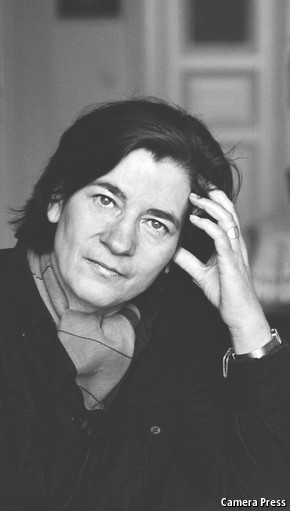
More wolf than angel
They Divided the Sky. By Christa Wolf. Translated by Luise von Flotow. University of Ottawa Press; 203 pages; C$18.95 and £12.95. Buy from Amazon.com, Amazon.co.uk
City of Angels: Or, the Overcoat of Dr Freud. By Christa Wolf. Translated by Damion Searls. Farrar, Straus and Giroux; 315 pages; $27. Buy from Amazon.com
CHRISTA WOLF, an East German writer known for her perspectives on power, was for a long time a serious contender for the Nobel prize in literature. Then the East German state ceased to exist in 1990, and the reputation of its most celebrated author also imploded. In 1993 Wolf was revealed to have been an informer for the secret police, the Stasi. Worse, to West German critics, she delayed publishing her own account of being spied upon, a novella written in 1979 and entitled “What Remains”, until the Berlin Wall came down.
In her last years Wolf, who died in 2011, was branded an opportunist who not only failed to blow the whistle on a corrupt dictatorship, but enjoyed all the privileges doled out to a “state poet”. Now a brace of new translations—of her first novel, and her last—offer English speakers a more generous reading of her literature and life.
An ardent young socialist convinced of culture’s mission to educate, Wolf wrote her first novel in 1963. Originally called “Divided Heaven”, it has now been reissued as “They Divided the Sky”. The difference goes deeper than the title. Luise von Flotow’s faithful new rendering replaces a text that had been badly twisted by a zealous editor who was determined to suppress all straying from the party line.
The novel, which catapulted Wolf to fame, tells the story of Manfred and Rita, lovers faced with the decision to stay in the GDR or to escape to the West in the tense months before the building of the Berlin Wall in 1961. The book’s political agenda is clear: Rita, like the author, decides to stay and work for a better society. Yet communist hardliners still condemned the book as decadent; Wolf was accused of portraying industrial workers in a negative light. What is striking in the new restored version is the degree to which Wolf, then still only in her early 30s, was willing to describe her country, warts and all. She does not shy from portraying factory slackers and the blind zeal of party hacks, nor from drawing a convincing portrait of Manfred, whose doubts and frustrations drive him to abandon Rita and his country.
The new version introduces in English for the first time the introspective, autobiographical voice that became Wolf’s signature and strength. Its fragmented points of view and flashbacks were innovative. From the start her ambition was to honour the inner voice and “bridge the contradiction between party diktat and personal truthfulness”, in the words of her biographer, Jörg Magenau. This made her a revered, almost saintly figure to her East German readers; at the same time, her consistently uncertain, questioning tone put her on a collision course with the socialist leadership.
From 1965 on, Wolf’s fiction grew increasingly critical and was frequently censored. Yet unlike other writers, who were imprisoned or fled, she was protected by her popularity. This was to prove her greatest sin after 1989, when she was judged to be a “loyal dissident”—one who criticised from within rather than risking public opposition and exile. That charge of cowardice and complicity, and the damning Stasi file, are what Wolf attempts to answer in “City of Angels”.
The book is a diffuse, sometimes obscure mosaic of 1993, the year she spent in Los Angeles working at the Getty Research Institute as the Stasi revelations exploded back home. She had forgotten the four documented meetings with Stasi agents more than 30 years before. The revelation plunged her into an acute psychological crisis: had she repressed the memory, or was the episode forgotten because it was “relatively harmless”, as her biographer believes? An equally pressing question is why, despite her disillusionment with the increasingly repressive state, she chose to “stand by the flag”.
As she sifts through the tainted past, Wolf is horrified by her own “incurable” gullibility. She concludes that the Stasi encounters were “short and insignificant”. But she continues to probe. To try to understand how she could blindly defer to authority, she talks to Holocaust survivors and rereads exiled writers, such as Thomas Mann and Bertolt Brecht, who fled from Hitler to Santa Monica in the 1930s. Like Günter Grass, another German writer who had to confront his past, she locates the roots of her blind spot in a Nazi childhood, which bred in Wolf a longing “to be in harmony with those in charge”.
If it is easy to judge Wolf in the black-and-white grid of freedom versus dictatorship, it is more difficult to classify her as a writer. Yet her quest for personal integrity within a flawed system, and the honesty of her prose, cannot help but impress. In the end, no one judged Christa Wolf more harshly than herself.
